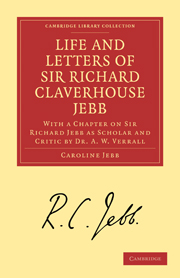 Life and Letters of Sir Richard Claverhouse Jebb, O. M., Litt. D.
Life and Letters of Sir Richard Claverhouse Jebb, O. M., Litt. D. Book contents
- Frontmatter
- PREFACE
- Contents
- CHAPTER I Family History
- CHAPTER II 1841—1858: Childhood and School Days
- CHAPTER III 1858—1862: Undergraduate Years
- CHAPTER IV 1862—1864: Fellowship and College Work.—Tour in Egypt
- CHAPTER V 1865—1870: Diary and Letters.—Public Oratorship
- CHAPTER VI 1871—1872: Letters to C. L. S.
- CHAPTER VII 1872—1874: Cambridge Life and Work
- CHAPTER VIII 1874—1878: Marriage.—Election to Glasgow Chair. Inaugural Address. Letters by Rev. Dr Denney, and Mr R. P. G. Williamson, M.A.—Visit to Italy and Greece.—Illness
- CHAPTER IX 1878—1880: British School at Athens. Hellenic Society.—Visit to Paris.—Challenge by Dr Blackie.—Visit to Venice
- CHAPTER X 1881—1883: Springfield.—Bentley.—Attack on Glasgow University.—The Troad.—School at Athens
- CHAPTER XI 1883—1889: Visit to America.—Professor Fawcett.—Death of Mr Robert Jebb.—Royal Academy.—Ode to Bologna.—Resignation of Greek Chair in Glasgow
- CHAPTER XII 1889—1894: Regius Professor of Greek at Cambridge.—Rede Lecture.—Election to Parliament. First Speech
- CHAPTER XIII 1894—1896: The Welsh Church Disestablishment Bill. Speech.—Illness
- CHAPTER XIV 1896—1898: Conference on Secondary Education.—Visit to the Riviera.—Voluntary Schools' Grant Bill. Sir John Gorst's Education Bill. Burial Grounds Committee
- CHAPTER XV 1898—1900: Death of Mr Gladstone.—Speech on the Rating of Clergymen.—Letters.—Romanes Lecture.—War. Consultation's Committee.—Knighthood
- CHAPTER XVI 1900—1901: Re-election.—Death of the Queen.—Deputation to Mr Balfour.—Irish University Commission
- CHAPTER XVII 1902—1903: British Academy.—Education Bill.—Tercentenary of Bodleian Library.—Trustee of British Museum.—Memorial Cloister at Charterhouse
- CHAPTER XVIII 1904—1905: Letters.—Order of Merit.—Defeat of Government
- CHAPTER XIX 1905: Visit to South Africa.—Last Illness
- The Scholar and Critic
- Index
CHAPTER XVI - 1900—1901: Re-election.—Death of the Queen.—Deputation to Mr Balfour.—Irish University Commission
Published online by Cambridge University Press: 07 September 2010
- Frontmatter
- PREFACE
- Contents
- CHAPTER I Family History
- CHAPTER II 1841—1858: Childhood and School Days
- CHAPTER III 1858—1862: Undergraduate Years
- CHAPTER IV 1862—1864: Fellowship and College Work.—Tour in Egypt
- CHAPTER V 1865—1870: Diary and Letters.—Public Oratorship
- CHAPTER VI 1871—1872: Letters to C. L. S.
- CHAPTER VII 1872—1874: Cambridge Life and Work
- CHAPTER VIII 1874—1878: Marriage.—Election to Glasgow Chair. Inaugural Address. Letters by Rev. Dr Denney, and Mr R. P. G. Williamson, M.A.—Visit to Italy and Greece.—Illness
- CHAPTER IX 1878—1880: British School at Athens. Hellenic Society.—Visit to Paris.—Challenge by Dr Blackie.—Visit to Venice
- CHAPTER X 1881—1883: Springfield.—Bentley.—Attack on Glasgow University.—The Troad.—School at Athens
- CHAPTER XI 1883—1889: Visit to America.—Professor Fawcett.—Death of Mr Robert Jebb.—Royal Academy.—Ode to Bologna.—Resignation of Greek Chair in Glasgow
- CHAPTER XII 1889—1894: Regius Professor of Greek at Cambridge.—Rede Lecture.—Election to Parliament. First Speech
- CHAPTER XIII 1894—1896: The Welsh Church Disestablishment Bill. Speech.—Illness
- CHAPTER XIV 1896—1898: Conference on Secondary Education.—Visit to the Riviera.—Voluntary Schools' Grant Bill. Sir John Gorst's Education Bill. Burial Grounds Committee
- CHAPTER XV 1898—1900: Death of Mr Gladstone.—Speech on the Rating of Clergymen.—Letters.—Romanes Lecture.—War. Consultation's Committee.—Knighthood
- CHAPTER XVI 1900—1901: Re-election.—Death of the Queen.—Deputation to Mr Balfour.—Irish University Commission
- CHAPTER XVII 1902—1903: British Academy.—Education Bill.—Tercentenary of Bodleian Library.—Trustee of British Museum.—Memorial Cloister at Charterhouse
- CHAPTER XVIII 1904—1905: Letters.—Order of Merit.—Defeat of Government
- CHAPTER XIX 1905: Visit to South Africa.—Last Illness
- The Scholar and Critic
- Index
Summary
The dissolution of Parliament came on September 25th. Sir John Gorst and Sir Richard Jebb were re-elected on October 1st, their “Address to their Constituents” and their thanks “for the high honour conferred upon them” appearing in the same number of the Cambridge University Reporter: so quickly was everything done. In November Jebb was also re-elected member of the Council of the Senate, his name being on the tickets of both academical parties.
The new year began with another loss for us, when Dr Sidgwick's very dear friend, Mr F. W. H. Myers, followed him to the shades. He died at Rome in January after a long illness.
The Queen died on January 22nd, 1901, in the 82nd year of her age and the 64th of her reign. The Vice-Chancellor wrote to Sir Richard on the 29th, “to say formally that I am trusting to you to prepare the address of condolence and congratulation which the Council agreed yesterday to propose… You may be glad to be reminded that the Addresses for many years back are preserved in Cooper's Annals. I have certified this as far as George I.”
The address ran as follows:
“TO THE KING's MOST EXCELLENT MAJESTY.
May it please Your Majesty,
We, Your Majesty's most dutiful subjects, the Chancellor, Masters, and Scholars of the University of Cambridge, humbly approach Your Royal Presence, to offer the expression of our deep sympathy with the great sorrow which has befallen YOUR MAJESTY and the British Empire.
- Type
- Chapter
- Information
- Life and Letters of Sir Richard Claverhouse Jebb, O. M., Litt. D.With a Chapter on Sir Richard Jebb as Scholar and Critic by Dr. A. W. Verrall, pp. 357 - 371Publisher: Cambridge University PressPrint publication year: 2010First published in: 1907


